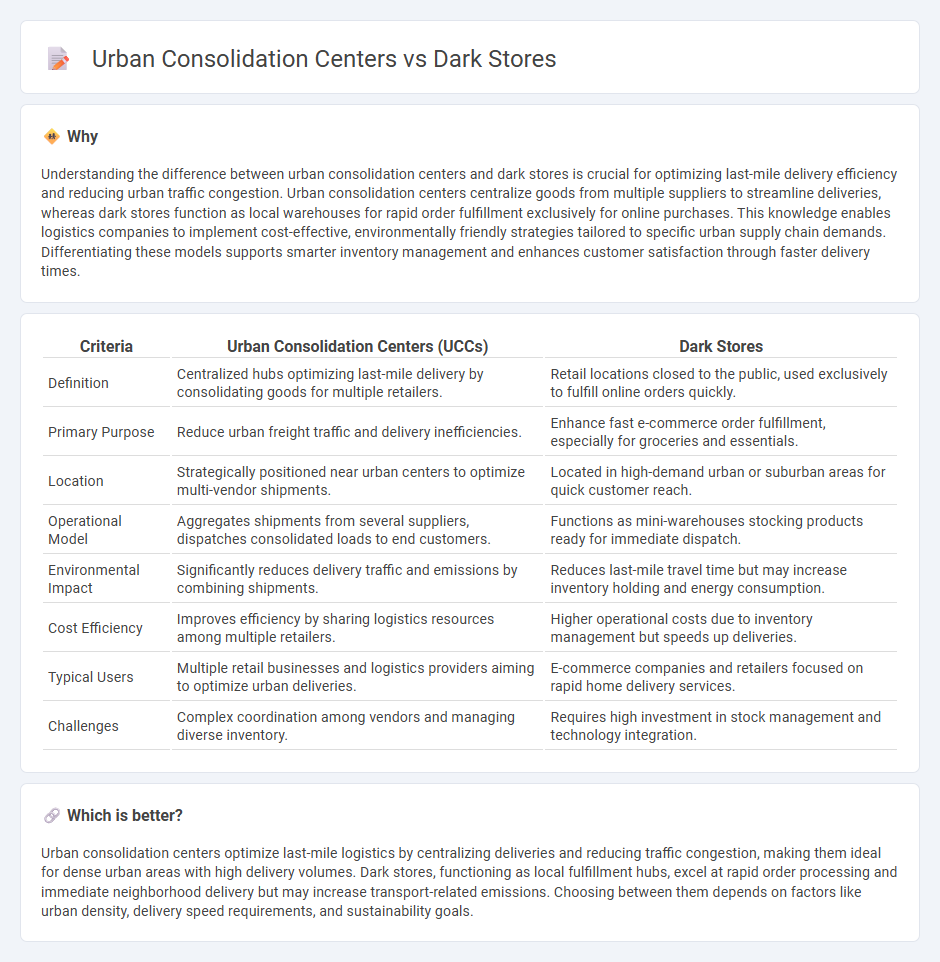
Urban consolidation centers streamline last-mile logistics by centralizing deliveries in dense city areas, reducing traffic congestion and emissions. Dark stores serve as local fulfillment hubs for e-commerce, enabling faster order processing and same-day delivery in urban zones. Explore how these innovative solutions reshape urban logistics efficiency and sustainability.
Why it is important
Understanding the difference between urban consolidation centers and dark stores is crucial for optimizing last-mile delivery efficiency and reducing urban traffic congestion. Urban consolidation centers centralize goods from multiple suppliers to streamline deliveries, whereas dark stores function as local warehouses for rapid order fulfillment exclusively for online purchases. This knowledge enables logistics companies to implement cost-effective, environmentally friendly strategies tailored to specific urban supply chain demands. Differentiating these models supports smarter inventory management and enhances customer satisfaction through faster delivery times.
Comparison Table
| Criteria | Urban Consolidation Centers (UCCs) | Dark Stores |
|---|---|---|
| Definition | Centralized hubs optimizing last-mile delivery by consolidating goods for multiple retailers. | Retail locations closed to the public, used exclusively to fulfill online orders quickly. |
| Primary Purpose | Reduce urban freight traffic and delivery inefficiencies. | Enhance fast e-commerce order fulfillment, especially for groceries and essentials. |
| Location | Strategically positioned near urban centers to optimize multi-vendor shipments. | Located in high-demand urban or suburban areas for quick customer reach. |
| Operational Model | Aggregates shipments from several suppliers, dispatches consolidated loads to end customers. | Functions as mini-warehouses stocking products ready for immediate dispatch. |
| Environmental Impact | Significantly reduces delivery traffic and emissions by combining shipments. | Reduces last-mile travel time but may increase inventory holding and energy consumption. |
| Cost Efficiency | Improves efficiency by sharing logistics resources among multiple retailers. | Higher operational costs due to inventory management but speeds up deliveries. |
| Typical Users | Multiple retail businesses and logistics providers aiming to optimize urban deliveries. | E-commerce companies and retailers focused on rapid home delivery services. |
| Challenges | Complex coordination among vendors and managing diverse inventory. | Requires high investment in stock management and technology integration. |
Which is better?
Urban consolidation centers optimize last-mile logistics by centralizing deliveries and reducing traffic congestion, making them ideal for dense urban areas with high delivery volumes. Dark stores, functioning as local fulfillment hubs, excel at rapid order processing and immediate neighborhood delivery but may increase transport-related emissions. Choosing between them depends on factors like urban density, delivery speed requirements, and sustainability goals.
Connection
Urban consolidation centers streamline last-mile logistics by aggregating deliveries in central locations, reducing traffic congestion and emissions in city centers. Dark stores, functioning as localized fulfillment hubs for online orders, rely on these centers to efficiently replenish stock and expedite delivery processes. This synergy enhances urban supply chain efficiency by minimizing delivery distances and optimizing inventory management.
Key Terms
Fulfillment
Dark stores serve as dedicated fulfillment hubs strategically located within urban areas, optimizing same-day or next-day deliveries by minimizing last-mile transit times. Urban consolidation centers aggregate goods from multiple suppliers, enabling bulk shipments that reduce traffic congestion and emissions while improving delivery efficiency. Discover how these innovative fulfillment models transform urban logistics and customer satisfaction.
Last-mile delivery
Dark stores function as localized fulfillment centers optimized for rapid last-mile delivery, enabling retailers to process online orders efficiently within dense urban areas. Urban consolidation centers serve as centralized hubs where goods from multiple suppliers are aggregated and sorted for eco-friendly, consolidated last-mile distribution, reducing delivery times and urban congestion. Explore how these innovations are transforming last-mile logistics to meet growing consumer demand and sustainability goals.
Inventory management
Dark stores utilize real-time inventory management systems to enable rapid order fulfillment by maintaining dedicated stock for online orders, minimizing stockouts and ensuring product availability. Urban consolidation centers optimize inventory by centralizing stock from multiple suppliers, reducing redundancy and streamlining last-mile delivery through synchronized shipments. Explore deeper insights into how inventory management strategies differ in dark stores and urban consolidation centers to enhance supply chain efficiency.
Source and External Links
What Is a Dark Store? - NetSuite - A dark store is a brick-and-mortar retail location converted solely to fulfill online orders, often located in cheaper suburban areas, optimized for pickers rather than in-person customers, and arose in the UK during the pandemic to meet growing online shopping demand
Dark stores in retail: Concept, benefits, challenges, strategies 2025 - Dark stores operate like warehouses focused on picking, packing, and delivering online orders quickly, growing in popularity due to the rise of eCommerce and customer demand for fast, convenient delivery
Dark store - Wikipedia - Dark stores are retail outlets or distribution centers designed exclusively for online shopping, often enabling click-and-collect or rapid delivery services, with their concept originating in the UK and spreading internationally
 dowidth.com
dowidth.com